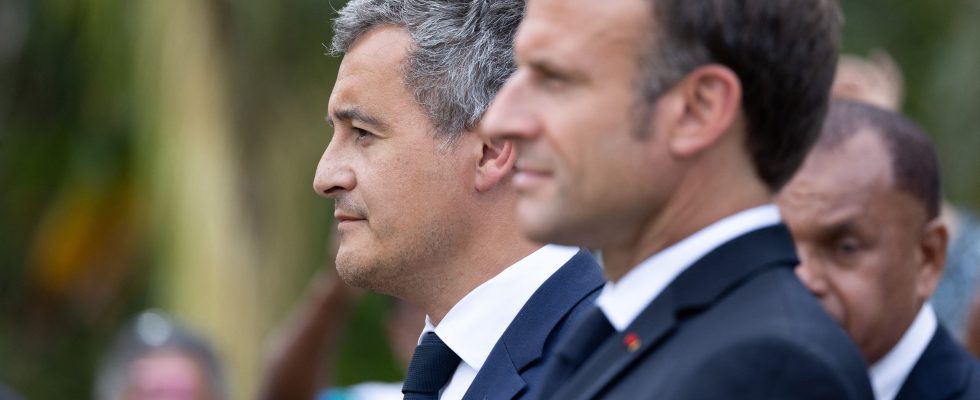A poisoned gift? A bombshell ? An unidentified political object? Regardless of the image used, one certainty: the report on irregular immigration, published this Thursday, January 4 by the Court of Auditors, will not please Emmanuel Macron, nor his Minister of the Interior, Gérald Darmanin. They who thought they were turning the page on the rifts of the majority and the small arrangements between ex-enemies with the adoption of the text on immigration in a public session on December 19, find themselves with some 140 biting pages on the policy pursued in recent years. . Certainly, they escaped the worst, the publication of the report was initially scheduled for December 13 in the middle of parliamentary psychodrama. Admittedly, it only deals with part of migration policy, asylum and the issuance of visas appearing in another report. But it hits where the government has chosen to place emphasis in recent years: the fight against illegal immigration, deeming it to be at the heart of public opinion’s expectations.
By criticizing the measures already in place and judging those adopted painfully at the end of 2023 as unsuitable for the needs, the institution chaired by the ex-socialist Pierre Moscovici is sending a severe warning to the executive. “The challenge of the fight against irregular immigration is as much organizational as legal,” notes the Court. Before adding: “The legislative framework has been the subject of 133 modifications in less than ten years, while the Ministry of the Interior tends, according to current events, to reaffirm its priorities by circulars, without constituting for so much global strategy”. Clearly, it was not necessary to legislate to improve the effectiveness of the policy pursued, but rather to give the administrations concerned the means to act. Otherwise, the 1.8 billion euros that France devotes, according to the Court’s calculation, each year to the fight against irregular immigration, are in vain.
Neither of the two main aspects of this policy finds favor in the eyes of the Court. In terms of border management, magistrates speak of “increasing pressure” for “uncertain effectiveness”. In the language of Rue Cambon, the formula is clear. Particularly ineffective? Controls at France’s land borders for which France has applied a regime derogating from the Schengen agreements since 2015 and to which it devotes very large human and material resources. For a questionable result: nearly 240,000 entry refusals were pronounced between 2018 and 2022, but the overall number of irregular entries into the territory continues to grow.
The thorny question of OQTF
But it is above all on the second point, the fight against people already in an irregular situation in France, that the Court is most severe. The picture it paints of the treatment of obligations to leave French territory (OQTF) is devastating for the government which has made it a key point of its policy. Between 2019 and 2022, notes the Court, the prefects pronounced 447,257. But, she continues, most prefectures are overloaded, make legal errors in the face of a particularly complex legal framework, and encounter difficulties in respecting the legal deadlines. Hence, among other reasons, the low execution rate of OQTFs, of around 10%.
In this matter, the Court criticizes the very French idea – and which further fueled the debates in the fall – that as many OQTFs as possible must be issued to discourage new arrivals. False, say the magistrates of rue Cambon. On the contrary, a large number of OQTFs with a low execution rate sends “a bad signal”. It is therefore better to target removal on a limited number of people rather than multiplying OQTFs. In this regard, the Court welcomes the strategy adopted by Gérald Darmanin since August 2022 to concentrate efforts on people presenting disturbances to public order. But in addition to the difficulty of returning to countries in conflict or unstable, the Court deplores that the strategy for defining these profiles is not formalized, nor shared between services, making their effective removal complex. Here again, the administration is struggling to follow political injunctions, the authors regret.
Above all, for other profiles, the international comparisons studied by the Court show that it is not physically possible to remove the more than 100,000 people currently subject to a removal order. For them, assistance with voluntary return is the most realistic option, especially since with 4,979 assisted returns carried out in 2022, France is significantly behind its European neighbors (26,545 in Germany the same year ). To achieve this, the Court suggests relaxing this system, access to which is too restrictive, even though it does not appear in the December draft.
But the essential message is undoubtedly still elsewhere, in a prerequisite that the Court sets for any reform of the system throughout its report: respect for the “legal framework for the protection of fundamental rights”. Discreet but very political way of warning those who would be tempted to review our international commitments in terms of human rights. Or those who, in the immigration bill, defended restrictive measures, such as the reintroduction of the offense of illegal residence or the removal of protections enjoyed by certain irregular foreigners. Obviously, the Court will defend itself from the slightest political message and will assert that it is only in its role of “super controller” of public spending. But there are calendars…
.
